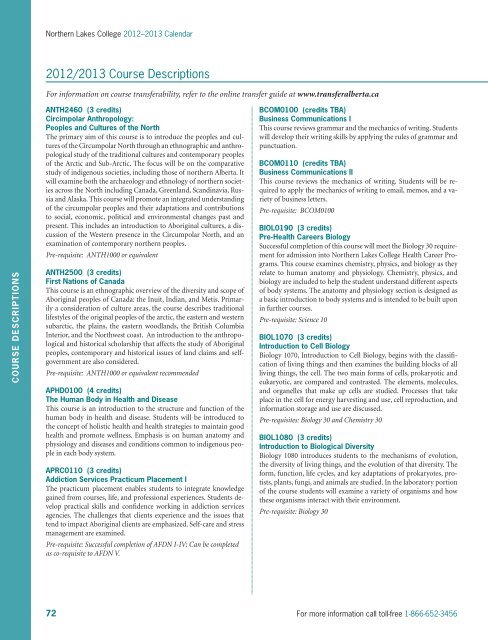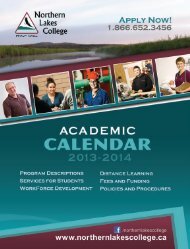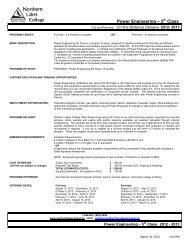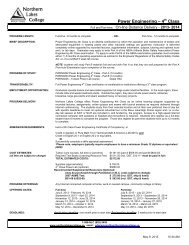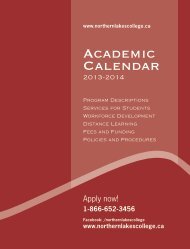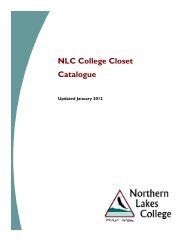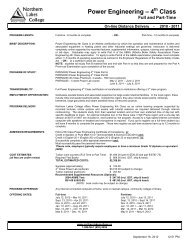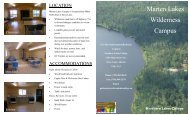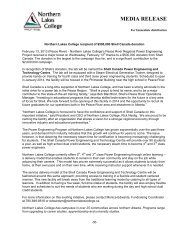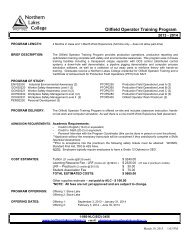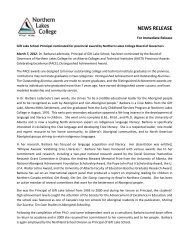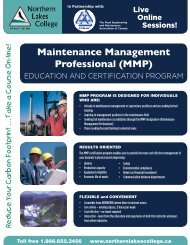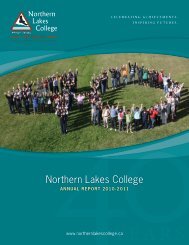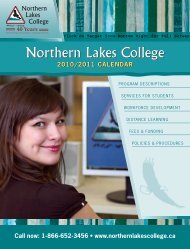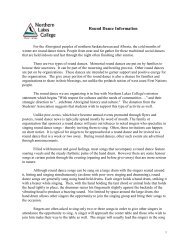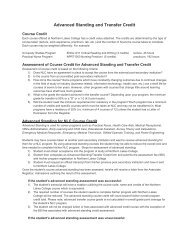NLC Calendar (PDF) - Northern Lakes College
NLC Calendar (PDF) - Northern Lakes College
NLC Calendar (PDF) - Northern Lakes College
You also want an ePaper? Increase the reach of your titles
YUMPU automatically turns print PDFs into web optimized ePapers that Google loves.
<strong>Northern</strong> <strong>Lakes</strong> <strong>College</strong> 2012–2013 <strong>Calendar</strong><br />
2012/2013 Course Descriptions<br />
For information on course transferability, refer to the online transfer guide at www.transferalberta.ca<br />
course descriptions<br />
ANTH2460 (3 credits)<br />
Circimpolar Anthropology:<br />
Peoples and Cultures of the North<br />
The primary aim of this course is to introduce the peoples and cultures<br />
of the Circumpolar North through an ethnographic and anthropological<br />
study of the traditional cultures and contemporary peoples<br />
of the Arctic and Sub-Arctic. The focus will be on the comparative<br />
study of indigenous societies, including those of northern Alberta. It<br />
will examine both the archaeology and ethnology of northern societies<br />
across the North including Canada, Greenland, Scandinavia, Russia<br />
and Alaska. This course will promote an integrated understanding<br />
of the circumpolar peoples and their adaptations and contributions<br />
to social, economic, political and environmental changes past and<br />
present. This includes an introduction to Aboriginal cultures, a discussion<br />
of the Western presence in the Circumpolar North, and an<br />
examination of contemporary northern peoples.<br />
Pre-requisite: ANTH1000 or equivalent<br />
ANTH2500 (3 credits)<br />
First Nations of Canada<br />
This course is an ethnographic overview of the diversity and scope of<br />
Aboriginal peoples of Canada: the Inuit, Indian, and Metis. Primarily<br />
a consideration of culture areas, the course describes traditional<br />
lifestyles of the original peoples of the arctic, the eastern and western<br />
subarctic, the plains, the eastern woodlands, the British Columbia<br />
Interior, and the Northwest coast. An introduction to the anthropological<br />
and historical scholarship that affects the study of Aboriginal<br />
peoples, contemporary and historical issues of land claims and selfgovernment<br />
are also considered.<br />
Pre-requisite: ANTH1000 or equivalent recommended<br />
APHD0100 (4 credits)<br />
The Human Body in Health and Disease<br />
This course is an introduction to the structure and function of the<br />
human body in health and disease. Students will be introduced to<br />
the concept of holistic health and health strategies to maintain good<br />
health and promote wellness. Emphasis is on human anatomy and<br />
physiology and diseases and conditions common to indigenous people<br />
in each body system.<br />
APRC0110 (3 credits)<br />
Addiction Services Practicum Placement I<br />
The practicum placement enables students to integrate knowledge<br />
gained from courses, life, and professional experiences. Students develop<br />
practical skills and confidence working in addiction services<br />
agencies. The challenges that clients experience and the issues that<br />
tend to impact Aboriginal clients are emphasized. Self-care and stress<br />
management are examined.<br />
Pre-requisite: Successful completion of AFDN I-IV; Can be completed<br />
as co-requisite to AFDN V.<br />
BCOM0100 (credits TBA)<br />
Business Communications I<br />
This course reviews grammar and the mechanics of writing. Students<br />
will develop their writing skills by applying the rules of grammar and<br />
punctuation.<br />
BCOM0110 (credits TBA)<br />
Business Communications II<br />
This course reviews the mechanics of writing. Students will be required<br />
to apply the mechanics of writing to email, memos, and a variety<br />
of business letters.<br />
Pre-requisite: BCOM0100<br />
BIOL0190 (3 credits)<br />
Pre-Health Careers Biology<br />
Successful completion of this course will meet the Biology 30 requirement<br />
for admission into <strong>Northern</strong> <strong>Lakes</strong> <strong>College</strong> Health Career Programs.<br />
This course examines chemistry, physics, and biology as they<br />
relate to human anatomy and physiology. Chemistry, physics, and<br />
biology are included to help the student understand different aspects<br />
of body systems. The anatomy and physiology section is designed as<br />
a basic introduction to body systems and is intended to be built upon<br />
in further courses.<br />
Pre-requisite: Science 10<br />
BIOL1070 (3 credits)<br />
Introduction to Cell Biology<br />
Biology 1070, Introduction to Cell Biology, begins with the classification<br />
of living things and then examines the building blocks of all<br />
living things, the cell. The two main forms of cells, prokaryotic and<br />
eukaryotic, are compared and contrasted. The elements, molecules,<br />
and organelles that make up cells are studied. Processes that take<br />
place in the cell for energy harvesting and use, cell reproduction, and<br />
information storage and use are discussed.<br />
Pre-requisites: Biology 30 and Chemistry 30<br />
BIOL1080 (3 credits)<br />
Introduction to Biological Diversity<br />
Biology 1080 introduces students to the mechanisms of evolution,<br />
the diversity of living things, and the evolution of that diversity. The<br />
form, function, life cycles, and key adaptations of prokaryotes, protists,<br />
plants, fungi, and animals are studied. In the laboratory portion<br />
of the course students will examine a variety of organisms and how<br />
these organisms interact with their environment.<br />
Pre-requisite: Biology 30<br />
72<br />
For more information call toll-free 1-866-652-3456


